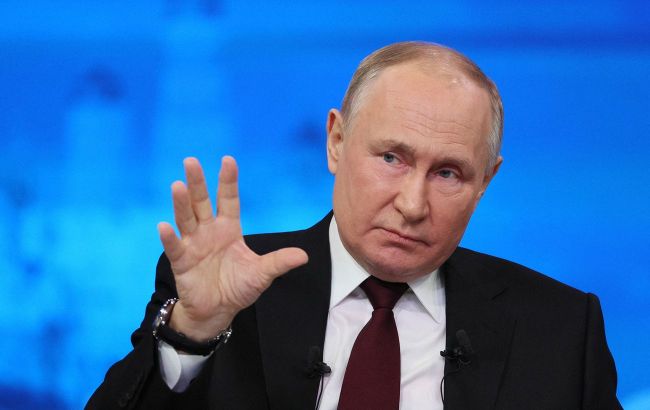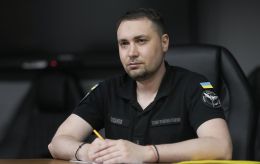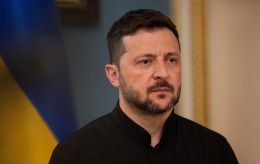Kremlin's 'hellish' assault on Ukraine isn't random - ISW explains real motive
 Russian President Vladimir Putin (photo: Getty Images)
Russian President Vladimir Putin (photo: Getty Images)
Russia is trying to convince the world that its victory is inevitable. However, analysts believe this to be an illusion, reports the American Institute for the Study of War (ISW).
It is noted that Russian President Vladimir Putin is using massive strikes on Ukrainian cities, aggressive rhetoric, and the West’s excessive pessimism about the battlefield situation in Ukraine as components of a multifaceted strategy aimed at undermining Ukrainian morale and convincing the West of Russia’s inevitable victory and the futility of continued support for Ukraine.
The Institute recalled that over the past eight months, Russian forces have intensified long-range strikes on Ukrainian territory and, since January 2025, have carried out seven of the largest missile and drone attacks since the beginning of the full-scale war.
"Russian officials are currently inundating the information space with calls for Ukraine to make concessions on its sovereignty and territorial integrity, although most of these statements are consistent with long-standing Russian war demands and in fact demonstrate that Russia's demands have not changed over the last three years of war," the report states.
Disruption of Western aid
The ISW reminds that Russia’s stated demands ignore the fact that the situation on the front lines has changed drastically since early 2022, and that three years of losses in manpower and equipment have significantly reduced the Russian army’s ability to conquer all of Ukraine.
Analysts note a substantial slowdown in the pace of Russian offensives, as Russian forces continue to suffer personnel losses and increasingly rely on poorly trained and inadequately equipped infantry to achieve territorial gains.
However, the report states that Putin still seeks to distract from the actual situation on the battlefield, as halting Western military assistance to Ukraine remains Russia’s only realistic hope for winning this war.
"The Kremlin is attempting to leverage large strike packages and increasingly aggressive rhetorical efforts to distract from the Russian military's poor performance during this current stage of the war. Putin may assess that significant strikes against Ukrainian cities and aggressive Russian rhetoric against NATO and Eastern European states will draw sufficient attention away from Russia's slow, grinding advances in eastern Ukraine," ISW analysts believe.
Problems in the Russian army
In addition, the Institute for the Study of War (ISW) points out that Russian officials are attempting to conceal the true situation regarding the economic and logistical constraints that are increasingly hindering Russia's ability to achieve significant success on the battlefield.
The report recalls a recent statement by the Ukrainian Commander-in-Chief, General Oleksandr Syrskyi, who said that since the beginning of 2025, Russian forces have suffered 177,000 casualties. ISW continues to assess that Russia prioritizes the rapid deployment of low-quality personnel with minimal training and combat experience to achieve limited territorial gains, further undermining its capacity to conduct complex operations.
Moreover, the Institute notes that Russia’s defense-industrial complex is incapable of producing armored vehicles and artillery systems at a scale sufficient to offset current loss rates in the medium and long term.
"Russia is also facing significant challenges in balancing resource allocation between defense industrial production and civilian sectors, and is increasingly relying on migrant workers to alleviate significant labor shortages exacerbated by the war effort. The Kremlin may be reassessing its ability to sustain a long-term war effort and appears to be reprioritizing its efforts to convince the West to preemptively concede to Russian demands in light of Russia's economic and military constraints," ISW analysts conclude.
Critical moment for allies
The Institute for the Study of War (ISW) also notes that Russia intensifies its information campaigns against Ukraine during critical moments when the West is debating the provision of additional military aid. Experts believe that Putin likely sees the current discussions around a possible ceasefire or peace agreement as another such pivotal moment for Ukraine’s allies.
Analysts are convinced that Putin is likely counting on long-range strikes and aggressive rhetoric to instill a sense of hopelessness in Ukraine and the West, undermining the willingness of European capitals and the US to continue supporting the Ukrainian Armed Forces, while creating a false impression that Russia’s victory is inevitable.
“Russia is also platforming its partnerships with adversarial countries such as the People's Republic of China (PRC), Iran, and North Korea to push back on the appearance of diplomatic isolation and posture itself as a country with powerful allies who are willing to stand against the West,” ISW experts state.
Intensified Russian attacks
For the third consecutive night, starting from May 24, Russian forces have been launching massive attacks on Ukraine using Shahed strike drones, as well as cruise and ballistic missiles.
Last night, the Russian army once again targeted Ukraine with Shahed kamikaze drones.
Closer to morning, Tu-95 strategic bombers launched cruise missiles at Ukraine.
On the night of May 25, the Russian army launched dozens of ballistic and cruise missiles, as well as around 300 drones, against the country. There are casualties and injuries among the civilian population.
On the night of May 24, Russian forces fired more than 250 UAVs and 14 ballistic missiles at Ukraine. The main target of the attack was Kyiv, where 15 people were injured as a result of the strikes.
US President Donald Trump stated that Putin has gone mad and expressed his dissatisfaction with the attacks on Ukrainian cities and the killing of Ukrainian civilians.

